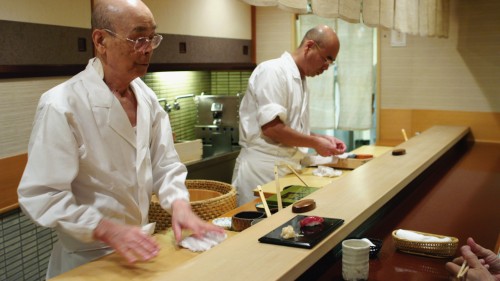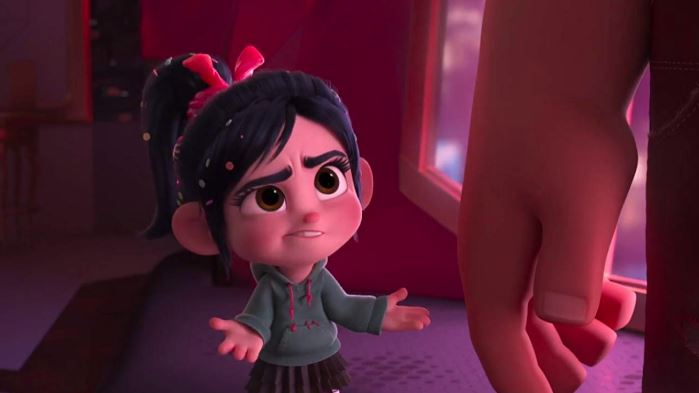 If Jiro Ono, the subject of David Gelb’s documentary, Jiro Dreams of Sushi, hadn’t found his passion in making sushi more than seventy years ago, he very well could have found a lucrative, successful career in life coaching. In his 80s and still working more steadfastly and efficiently than most young men in their 20s, Ono professes early on in the film his belief that one must fall in love with their profession and that hard work is “the key to being regarded honorably”, a sentiment which he expresses directly into the camera. He speaks with a firm but quiet earnestness that nonetheless bears a timbre of erudite command; you know that you’d be hopelessly foolish to not heed his words.
If Jiro Ono, the subject of David Gelb’s documentary, Jiro Dreams of Sushi, hadn’t found his passion in making sushi more than seventy years ago, he very well could have found a lucrative, successful career in life coaching. In his 80s and still working more steadfastly and efficiently than most young men in their 20s, Ono professes early on in the film his belief that one must fall in love with their profession and that hard work is “the key to being regarded honorably”, a sentiment which he expresses directly into the camera. He speaks with a firm but quiet earnestness that nonetheless bears a timbre of erudite command; you know that you’d be hopelessly foolish to not heed his words.
And heed his words you must, because our first introduction to Jiro Ono feels like looking into a mirror that reflects our own clownishness. Jiro’s the sort of man whose temperament and accomplishments can make even the skilled and successful feel hopelessly inadequate in comparison; when he talks of honorableness and dedication, one can’t help but feel shamed by his pointed declarations. The amazing thing is that that sudden, reactive perception of our personal shortcomings is accompanied by just as urgent a desire to make Jiro proud. He is the teacher whose praise you crave.
He’s also massively opaque to the point of nearly being impenetrable. Even when he’s discussing his life and his trade, Jiro remains something of an enigma. That may be solely because Jiro is truly one of a kind; he refuses to take work off except on national holidays, and even when he has a good reason to leave work– say, an awards ceremony honoring his career and influence– he’ll only stay just long enough before ducking out and returning to his restaurant, Sukiyabashi Jiro, a ten-seat sushi bar located in Ginza, a district of one of Tokyo’s twenty-three municipalities. It’s a level of commitment that’s alien to many, even to the highly fastidious and diligent. Who would rather be at work than on vacation? The answer: someone who truly cherishes what they do.
Jiro approaches his role in his restaurant with straight-faced discipline, meting out orders and delegating authority with a firm hand; he cares about what he does and part of his career means passing on that sensibility, as well as the necessary skills, to the next generation, from Yoshikazu, his oldest son, to Nakazawa, his senior apprentice. It’s how a person in the food industry maintains their legacy. And that”s a huge focal point of Jiro Dreams of Sushi, a film that at its core seeks to dissect the endless, towering accolades piled upon Jiro and his primary establishment (his younger son, Takashi, runs another Sukiyabashi Jiro restaurant in Roppongi Hills) and examine secrets of the sushi master’s success. If you accept the narrative presented here at face value, such achievements as Jiro has earned come through hard work, repetition, and persistent application to one’s craft– in other words, the secret is that there is no secret. Just the same adages that our parents and schoolteachers have bestowed on us since we were children.
But Gelb’s film hints at something more behind Jiro’s workmanship and drive than just professional ardor and the necessity of instruction. “Work to survive”, we’re told at one point, and if there’s a more perfectly succinct explanation behind Ono’s continued service to his art and to his restaurant, you’d be hard-pressed to find it. For Jiro, his sons, his apprentices, his peers, and even his fishmongers, the job isn’t about making the greatest profit while putting forth the least effort; it’s about siphoning one’s soul into every action that they take and everything they produce. For these men– who represent a distinctly traditional, “old-school” working philosophy– your career is a reflection of your self. It’s who you are. To strive for anything less than perfection, or at the very least the best you can do, is to do yourself a disservice. Jiro Dreams of Sushi is about becoming your profession, in a fashion, and when Jiro’s attitude and way of life is viewed through that lens, the film becomes eye-opening poetry.
It’s also the most savory film of the year. Out of all of the 2012 releases I’ve seen, I can think of few that elicited in me such strong visceral reactions to its imagery. Maybe the sushi-phobic won’t find much appeal in the many, many moments centered around the process of making sushi– from more instructional beats to a depiction of each movement of an actual meal served to ten appreciative customers– but if you even like the cuisine a little bit, Jiro Dreams of Sushi‘s greatest takeaway may be its power over your taste buds rather than its meditation on a highly dedicated man and his perspective on working life. Yet just as sushi depends on the balance between rice and fish, so too does Gelb’s film hinge upon harmony in its portrait of his subject and its culinary observations. Taken without one of these elements, the film would be incomplete; together, they blend into a joyful, insightful documentary.



2 Comments
Kami
I watched this on a whim on Netflix and it was one of my best impulse watches EVER. I personally really liked the interviews that revolved around his family and relationships, how Jiro is basically everyone’s boss, even to those who no longer work for him. Also, I am not the biggest fan of sushi, but I definitely went out and got some that night…
Andrew Crump
Hi Kami!
You know, you’re spot on about Jiro being everyone’s boss even if they don’t work for him anymore. For my part, he feels like my boss, and I’ve never met the guy in my life. I don’t want to disappoint him, and he’s half a world away.
And I definitely wanted sushi after watching this. I just knew that I would wind up being disappointed if I did get some, though; there’s no way it would compare to what Jiro and his sons and apprentices set out for their customers in shot after shot. It’s delicious for my eyes.